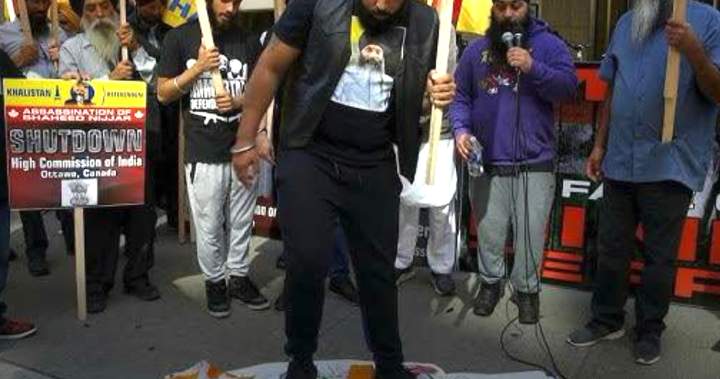A Sikh activist warned by police that his life is in danger has been charged with a dozen firearms-related offences, according to court documents obtained by Global News.
Ontario Provincial Police officers arrested Inderjeet Singh Gosal in Whitby, Ont., on Friday for careless use of a handgun and other related offences, the records show.
Gosal, who appeared in court in Oshawa on Monday, was charged along with Arman Singh, 23, of Toronto, and Jagdeep Singh, 41, a resident of New York.
A 36-year-old from Brampton, Ont. Gosal is a Canadian leader of the Khalistan movement that advocates for independence for India’s Sikh-majority Punjab region.
He runs a referendum campaign on Khalistan, a position he took over after its previous co-ordinator, Hardeep Singh Nijjar, was gunned down in Surrey, B.C., allegedly by Indian government agents.
Both Nijjar and Gosal are associates of Gurpatwant Singh Pannun, the New York-based leader of Sikhs of Justice, who was also targeted in a botched assassination plot by Indian intelligence.
In a recent interview with Global News, Gosal said the RCMP warned him his life was at risk and offered him police protection, which he declined. He blamed the Indian government for the plot.
A photo posted on Gosal’s social media on Sept. 11 showed him stomping on a picture of Indian Prime Minister Narendra Modi at a protest outside the Indian High Commission in Ottawa.

Get breaking National news
For news impacting Canada and around the world, sign up for breaking news alerts delivered directly to you when they happen.
Such displays have angered India’s government, which has demanded that Canadian police arrest pro-Khalistan activists it has labelled terrorists.
News of Gosal’s arrest first surfaced in the Indian press, which falsely reported it occurred in Ottawa and was in response to New Delhi’s demands for a crackdown on the Khalistan movement.
Quoting unnamed sources and providing no evidence, India’s press depicted the arrest as a “clamp down on extremist sleeper cells” after New Delhi shared “detailed dossiers” on Gosal with Ottawa.
Last week, Prime Minister Mark Carney’s National Security Advisor, Nathalie Drouin, met in New Delhi with her Indian counterpart, Ajit Doval.
While India’s official statement on the meeting made no mention of “transnational repression,” Drouin said in her news release that the parties had agreed to refrain from the practice.
The term “transnational repression” refers to India’s alleged clandestine role in Nijjar’s June 18, 2023, assassination, as well as its broader wave of violence against Canadian supporters of the Khalistan movement.
At an October 2024 news conference, the RCMP said Indian officials had worked with the Lawrence Bishnoi criminal organization to target Indo-Canadians.
As a result, Canada expelled six Indian diplomats and linked the operation to Modi’s right-hand man and home affairs minister, Amit Shah. India denied the allegations.
In January, the Hogue Commission report also identified India as “the second most active country engaging in electoral foreign interference in Canada,” behind only China.
But since taking office, Carney has made overtures to India, inviting Modi to the G7 summit in Alberta in June, and naming a new Canadian high commissioner to New Delhi.
Sikh-Canadian organizations are concerned that, under pressure to broaden trade relationships outside the United States, Carney has failed to hold India to account for its transnational repression campaign.
The World Sikh Organization of Canada accused India of spreading disinformation about last week’s meeting between Drouin and Doval, which it said was held to address India’s ongoing targeting of Canadian Sikhs.
“In the past month, law enforcement issued duty-to-warn notices to multiple Sikh activists across Canada, reflecting imminent and serious threats to their lives,” the group said in a news release.
It called on the Canadian government to immediately list the Bishnoi gang as a terrorist organization, and impose sanctions on Indian officials tied to transnational repression.
“Canada must remain vigilant, uphold the rule of law, and send a clear message to India that transnational repression and intimidation have no place in our country,” WSO president Danish Singh said.
Stewart.Bell@globalnews.ca
Read the full article here

